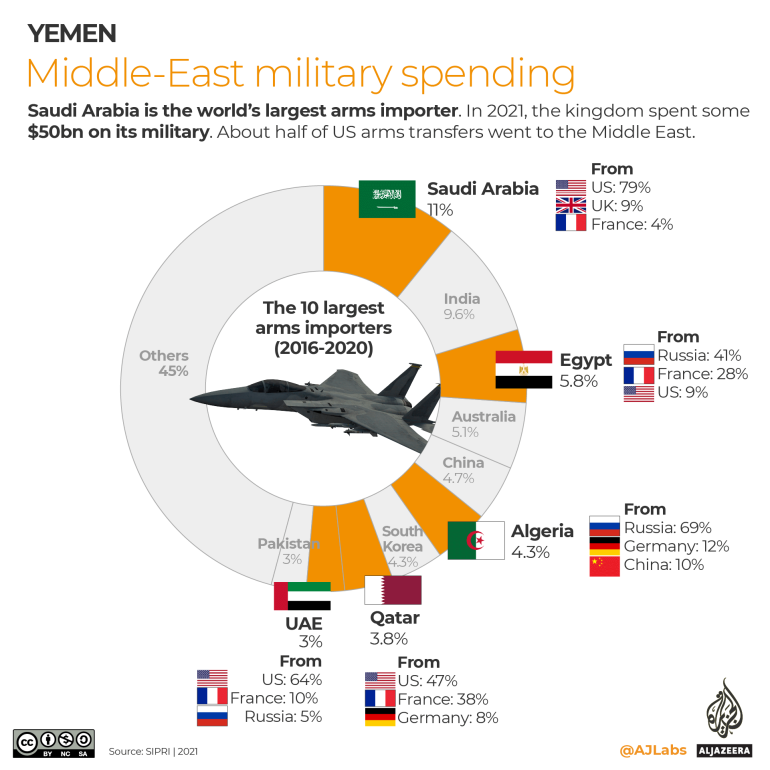US sends Patriot interceptors to Saudi to ease tensions: Reports
The transfer fulfils an urgent Saudi request that has become a point of tension between Riyadh and Washington.

The Biden administration has transferred a significant number of Patriot antimissile interceptors to Saudi Arabia, fulfilling an urgent request from the kingdom that has become a point of contention in relations between Washington and Riyadh, according to reports.
Senior US officials told reporters on Sunday that the weapons systems were sent to Saudi Arabia in recent weeks, which the kingdom had been requesting since late last year to fend off missile and drone attacks by Yemen’s Houthi group, The Associated Press news agency and the Wall Street Journal reported.
Keep reading
list of 3 itemsHouthis launch ‘barrage of attacks’ on multiple Saudi sites
Saudi Aramco’s 2021 profit jumps 124% on soaring crude prices
The officials did not give a number of how many Patriot interceptors had been sent, but told the AP that the decision was in line with President Joe Biden’s promise that “America will have the backs of our friends in the region”.
The move comes as the Biden administration has increasingly sought to convince Riyadh to pump more crude oil to help alleviate soaring prices spurred by Russia’s invasion of Ukraine.
To date, Saudi officials have resisted the appeal, stressing their commitment to output cuts agreed by the OPEC+ alliance of oil producers led by Riyadh and Moscow.

Houthi attacks and oil supplies
Instead, Saudi Arabia warned on Monday that Yemeni rebel attacks on the kingdom’s oil facilities pose a “direct threat” to global supplies.
Saudi Arabia “will not incur any responsibility” for shortages in oil supplies in light of the Iran-backed Houthi attacks, the foreign ministry said in a statement.
These cross-border assaults are a “direct threat to the security of oil supplies in these extremely sensitive circumstances witnessed by the global energy markets”, it added.
The statement came a day after Saudi Arabia acknowledged a temporary drop in production after the Houthis attacked a refinery with an armed drone. It urged the international community to “stand firm” against the Houthi rebel group.
The drone assault on the YASREF refinery in Yanbu Industrial City on the Red Sea “led to a temporary reduction in the refinery’s production”, the Saudi energy ministry said Sunday.
It added that the drop would “be compensated for from the inventory”, but did not provide numbers.
The Houthis said on Sunday that they launched cross-border drone and missile attacks that targeted a number of “vital and important” establishments.
Saudi-US relations
Saudi Crown Prince Mohammed bin Salman had maintained close ties with former US President Donald Trump, who avoided condemning MBS despite the US intelligence linking him to the killing of journalist Jamal Khashoggi in Istanbul in 2018.
Relations between the longtime allies have become more fraught under the Biden administration, with the incoming president promising to take a stronger stance against human rights violators, ending “offensive support” for Saudi Arabia-led forces fighting against the Houthis in Yemen, and refusing to deal directly with MBS.
Riyadh has also voiced anger over the Biden administration’s decision to remove the Houthi movement from its list of “international terrorist organisations”, although Washington in recent months has mulled reversing the decision following a series of drone and missile attacks on the United Arab Emirates (UAE).
Riyadh, meanwhile, has increasingly warned that its Patriot interceptors were running dangerously low amid continued Houthi air attacks.
In September, the AP reported that the US military had moved out of Saudi Arabia one of its Patriot systems that had been located at the Prince Sultan Air Base outside Riyadh.
Officials said at the time, the move was part of a larger shift in defence capabilities to prioritise Russia and China.
The revelation on Sunday came hours after US NSA Jake Sullivan condemned Houthi forces after they unleashed intense barrages of drone and missile strikes on Saudi Arabia’s critical energy facilities.
The attack sparked a fire at one site and temporarily cut oil production at another.